
The Bottom Line
Introduction & Drive Details
addlink has a new SSD in their arsenal that is capable of up to 7,100 MB/s throughput. addlink is a long-time partner with Phison Electronics, so it comes as no surprise that their newest, fastest SSD, the S95, is a collaboration with Phison. Based on the throughput, it's easy to discern that addlink's new flagship offering has at its heart Phison's second-generation E18 Gen4 controller.
Addlink's S95 is the second retail brand SSD we've tested based on Phison's E18 controller and a 96L Micron 1200 MT flash array. The drive series is available at 1, 2, and 4TB capacity points, and like most addlink SSDs, the S95 is what we call a bare-bones configuration, meaning it has no thermal label/heat sink or significant value adds. Typically, this bare-bones configuration results in addlink's offerings being among the most affordable compared with similarly configured competition.
addlink's bare-bones configuration strategy has been a recipe for success, and we expect to see the same happening for the S95. Having already tested several SSDs with similar hardware configurations, we expect the S95 to have a ton of performance on tap. Let's get into the review so we can put some actual numbers to addlink's fastest SSD ever and see how it stacks up on our new Gen4 only chart powered by our new Ryzen 5900X SSD test rig.
Drive Details
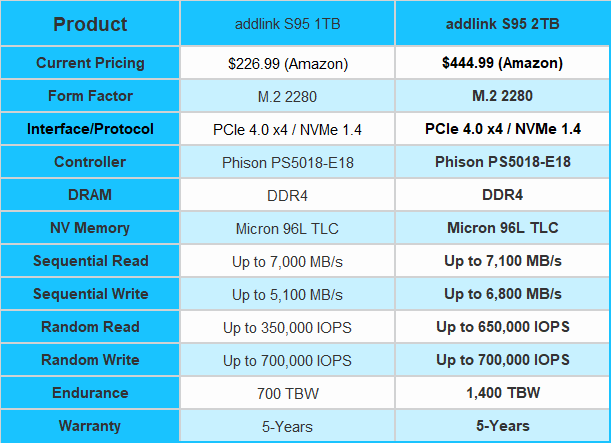
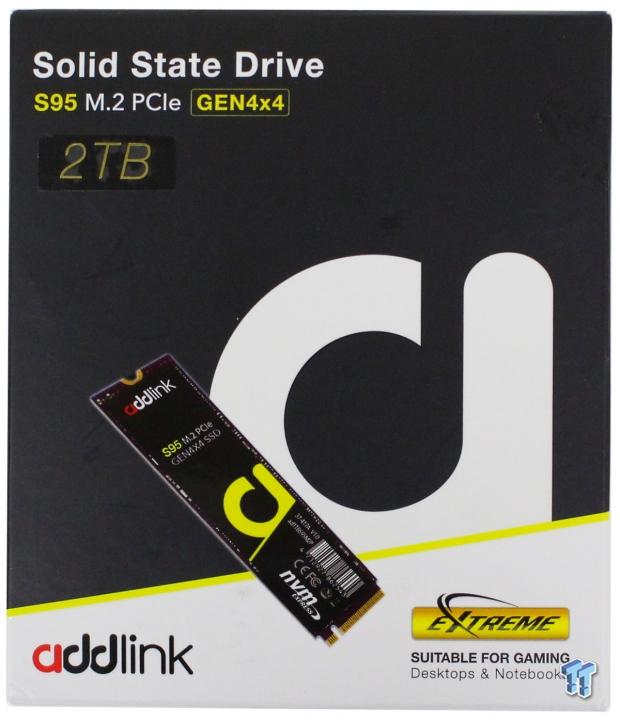
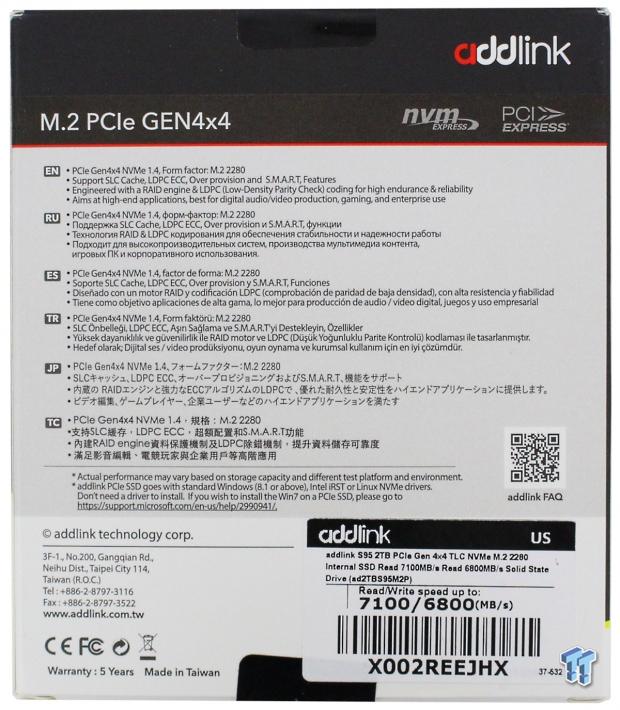


Jon's Test System Specifications
- Motherboard: ASUS ROG Crosshair Hero VIII Wi-Fi (buy from Amazon)
- CPU: AMD Ryzen 9 5900X
- Cooler: ARCTIC Liquid Freezer II 420 (buy from Amazon)
- Memory: Corsair Dominator Platinum RGB 32GB (2x16GB) DDR4 4000 (PC4-32000) C19 (buy from Amazon)
- Video Card: GIGABYTE GeForce RTX 2070 WINDFORCE 8G (buy from Amazon)
- Power Supply: Corsair AX1000 (buy from Amazon)
- Case: InWin X-Frame
- OS: Microsoft Windows 10 Pro 64-bit (buy from Amazon)
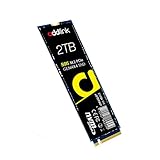
Free SSD Software
Addlink PCIe ToolBox
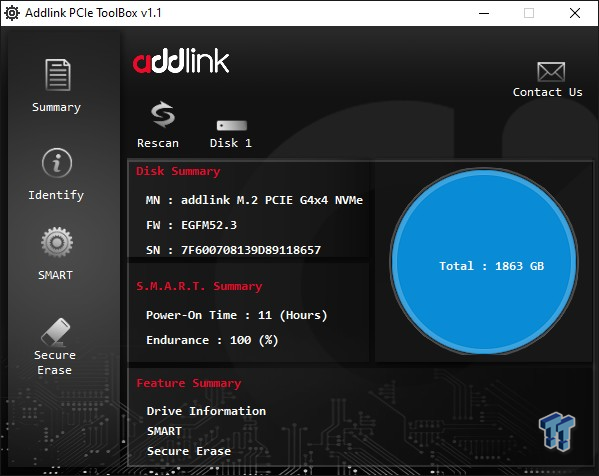
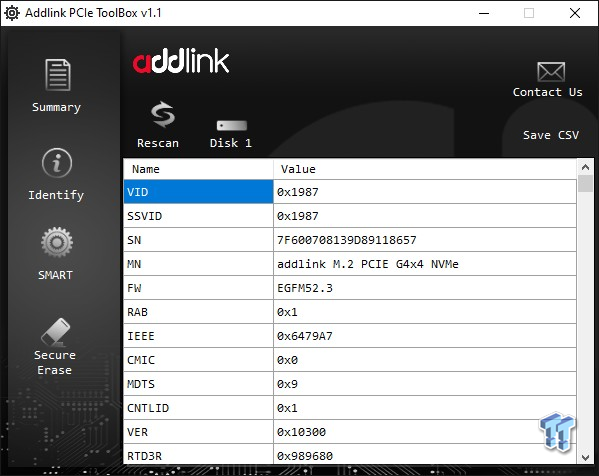
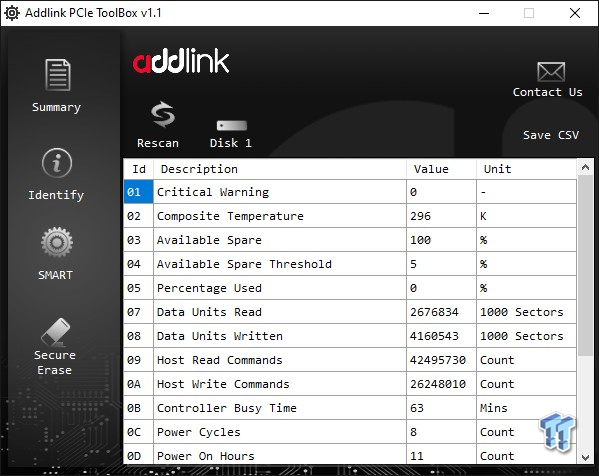
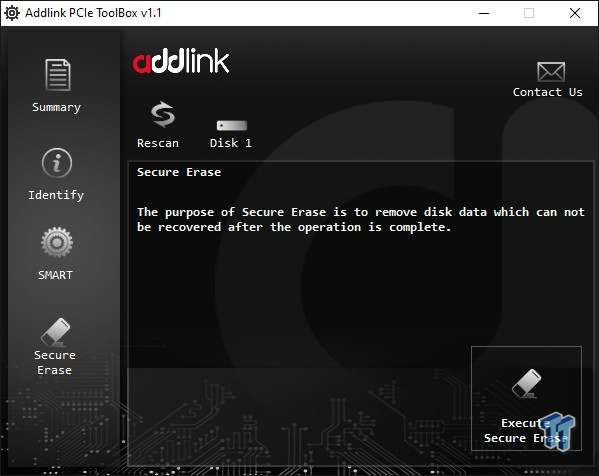
addlink offers a so-called SSD toolbox. However, you can't do anything useful with it, not even update the firmware.
We believe you will be better served with the following freeware. If you need to clone, there is freeware for that Click here to download and free monitoring software Click here to download.
Synthetic Benchmarks: CDM & Anvils
CrystalDiskMark
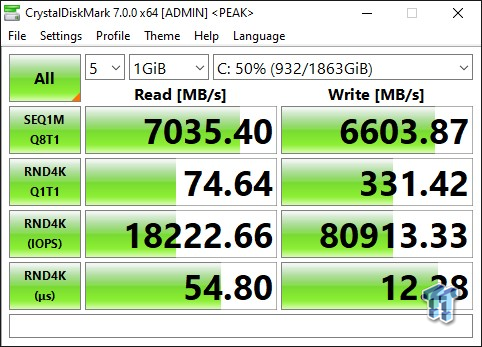
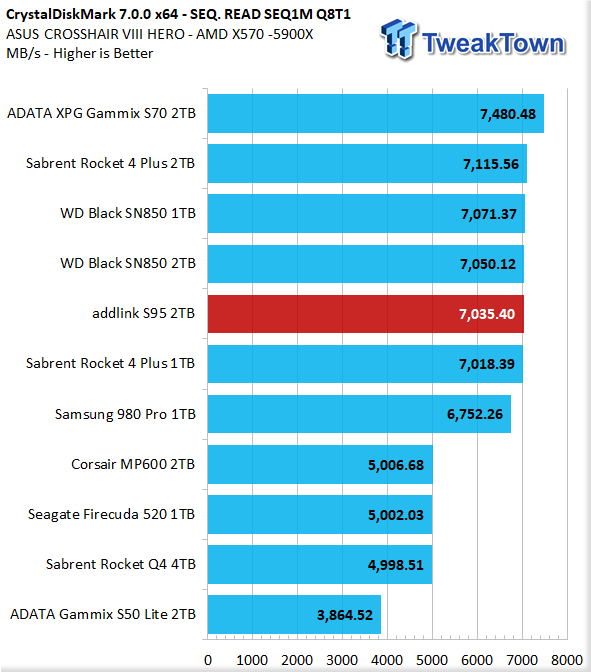
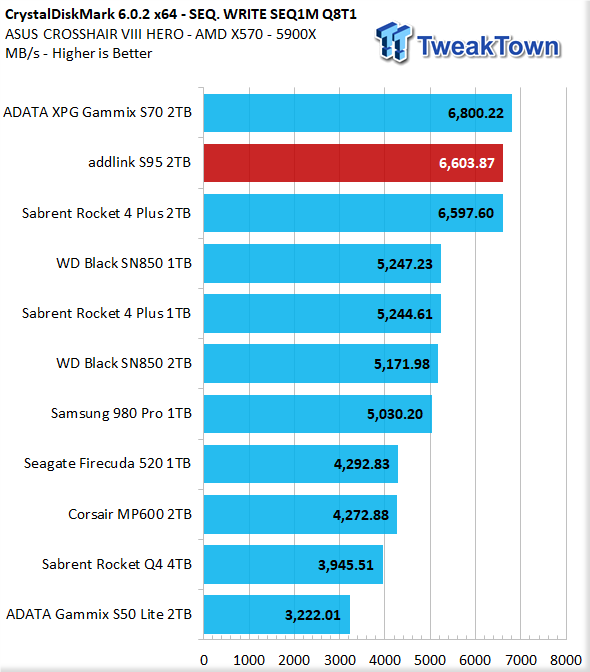
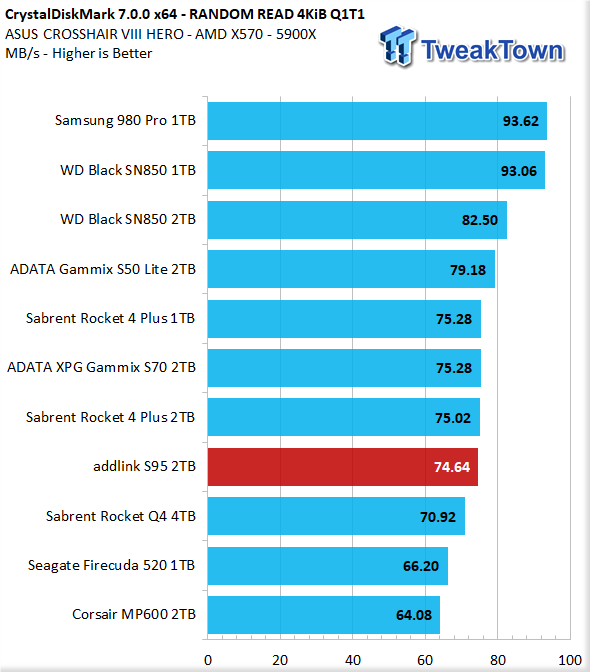
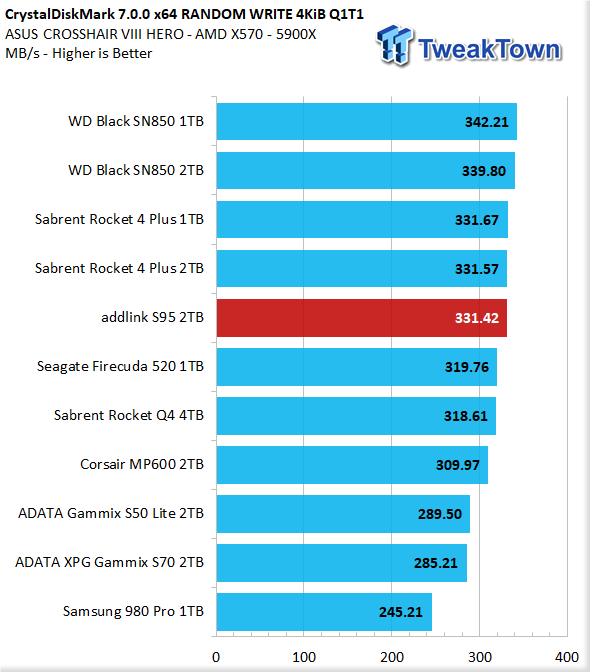
There we go, 7,000 MB/s throughput. Impressive, but not quite hitting factory spec of 7,100/6700. This is almost always the case no matter the SSD because we run our tests in a more demanding user state of the system disk, fifty percent filled with data.
Anvil's Storage Utilities
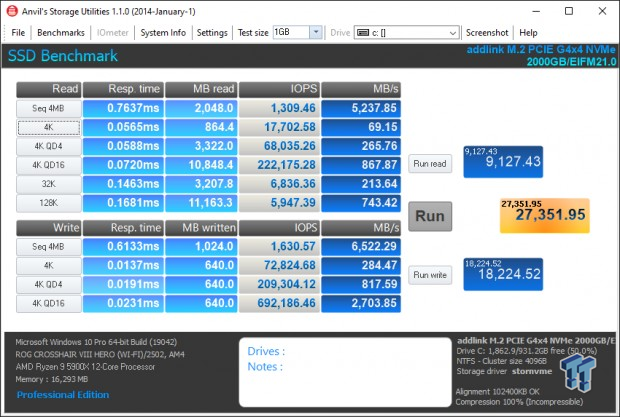
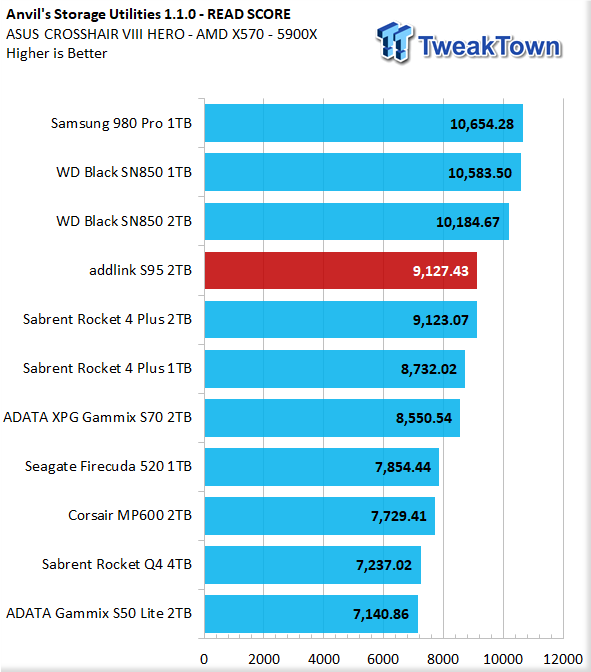
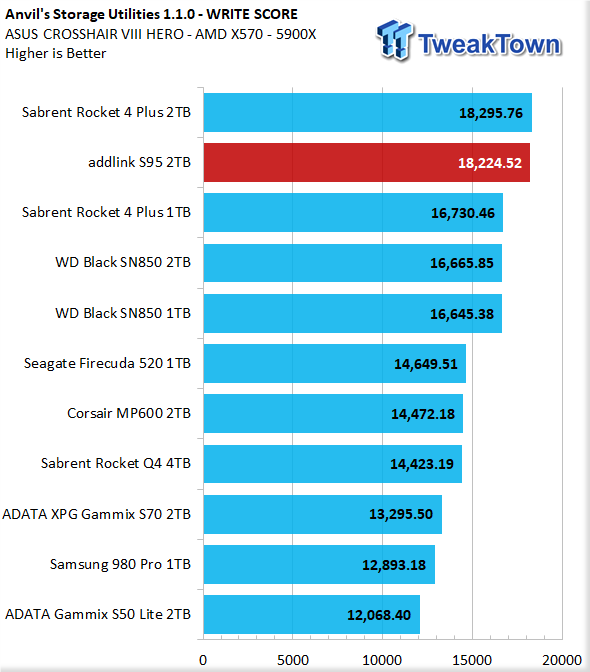
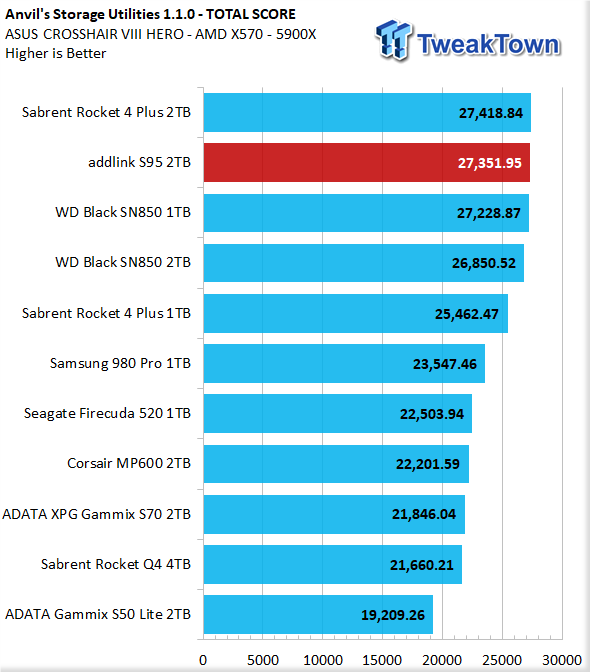
ASU gives us a good synthetic overview of what an SSD is all about. As expected, the S95 can deliver elite performance, as demonstrated by its monstrous overall score of over 27K. As we've come to expect from Phison E18 powered SSDs, the S95 is write centric, producing two-thirds of its overall score with overwhelming write numbers.
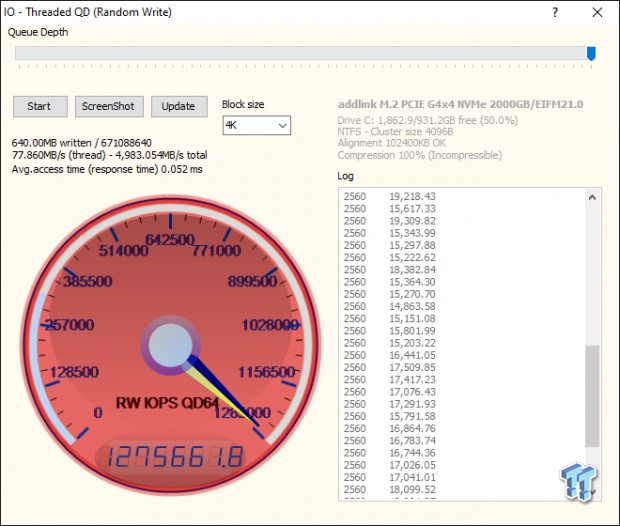
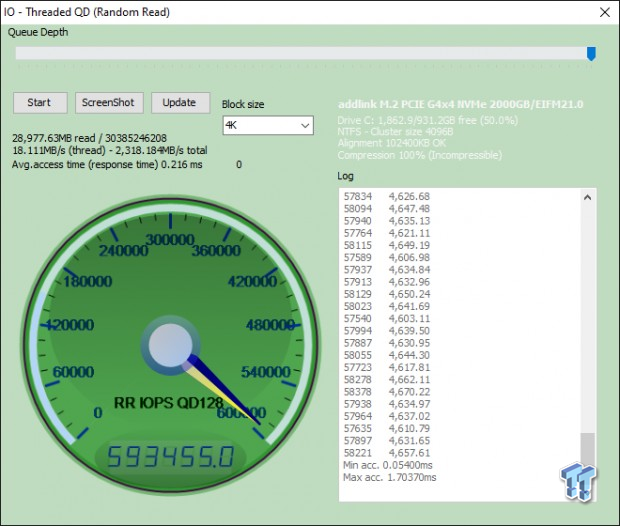
Max random reads, as expected, fall a bit short of factory specs, again due to our more demanding and more realistic user state. However, max random writes are stellar as expected, hitting a jaw-dropping 1.2 million IOPS at QD64. Impressive.
Synthetic Benchmarks: AS SSD & ATTO
AS SSD
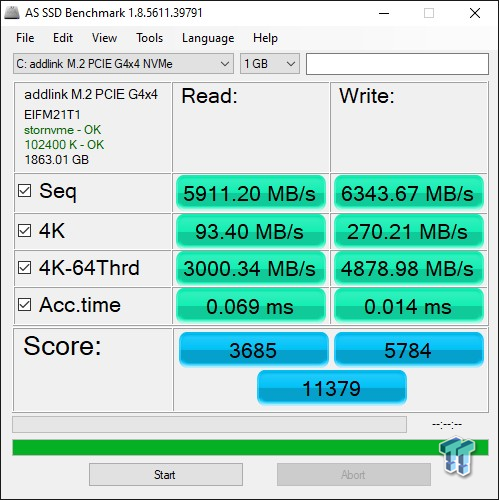
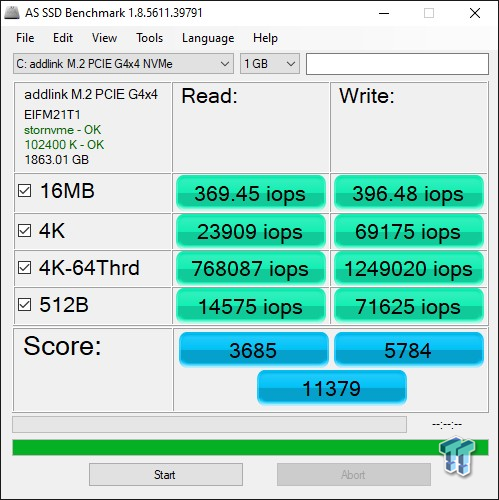
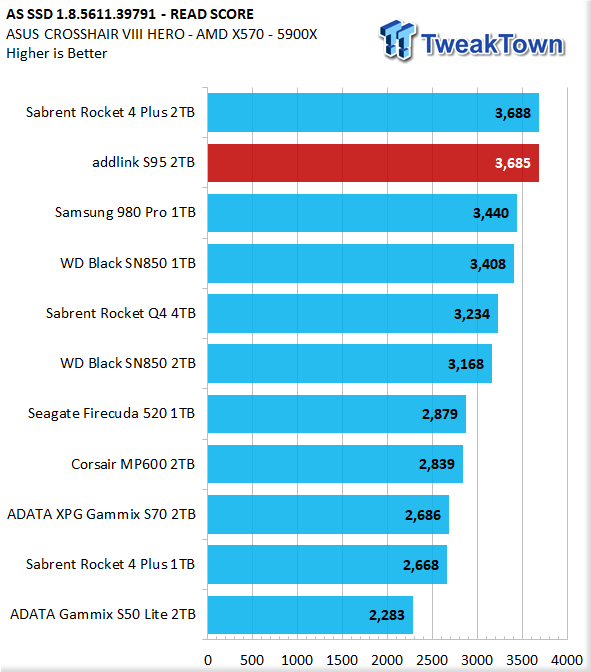
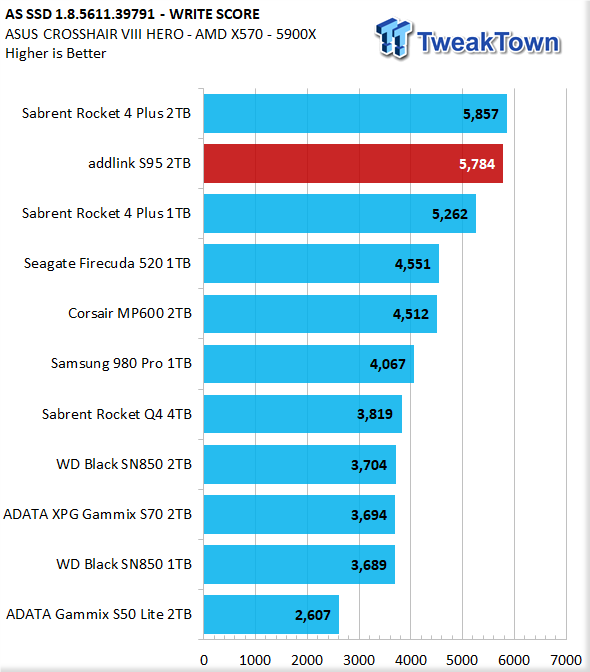
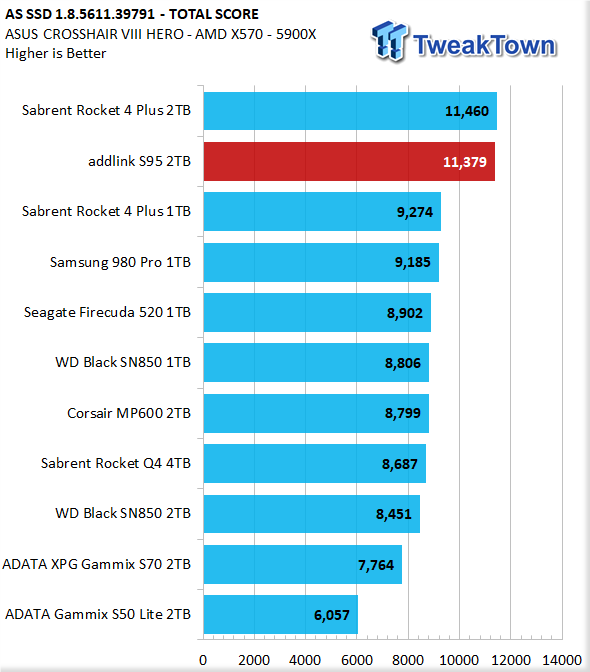
AS SSD is considered by some to be the most demanding synthetic test there is. However, Phison must not have gotten the memo because Phison based SSDs always shred AS SSD. The S95 is no exception and delivers a score that only a Phison E18 SSD can. Wow, over 2K higher than any non-E18 powered SSD.
ATTO
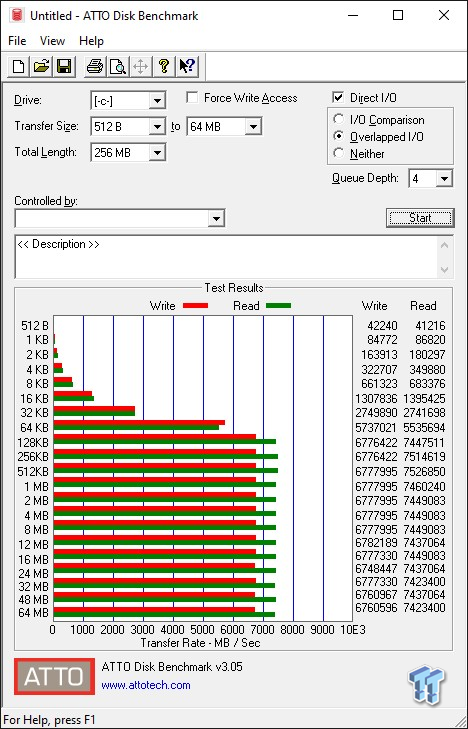
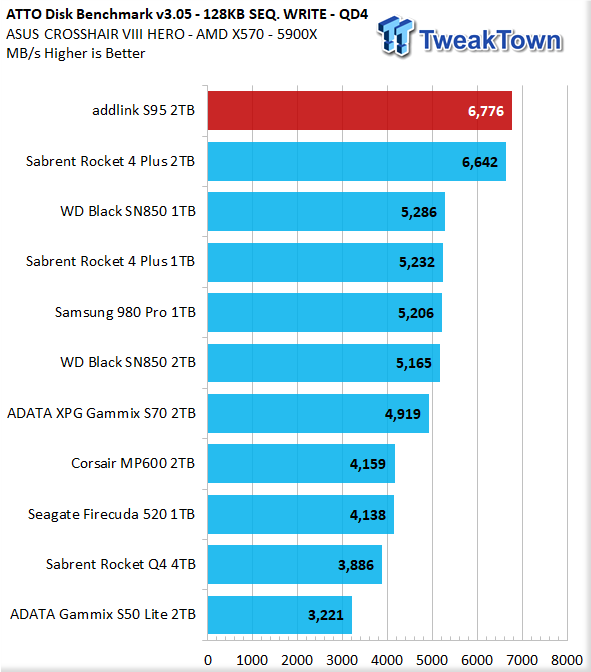
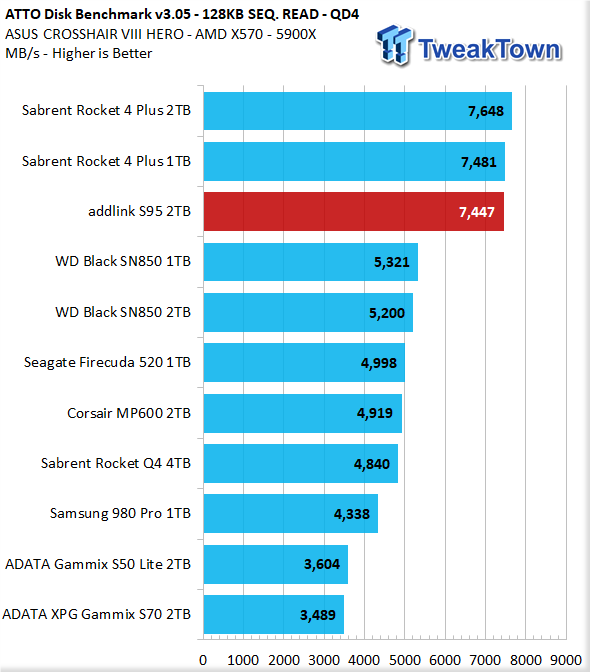
We want to see full performance at 128K transfers and 40 MB/s at 512B transfers, and the S95 gives us exactly what we are looking for. Phison E18 SSDs are unique in their ability to accomplish this feat because of the way they digest compressible data. When data is fully compressible, the S95 can generate a massive 7,500 MB/s throughput at 256 MB transfers.
Real-World Testing: Transfer Rates & Gaming
Transfer Rates
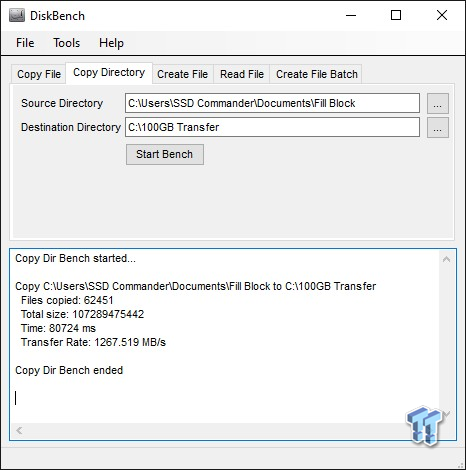
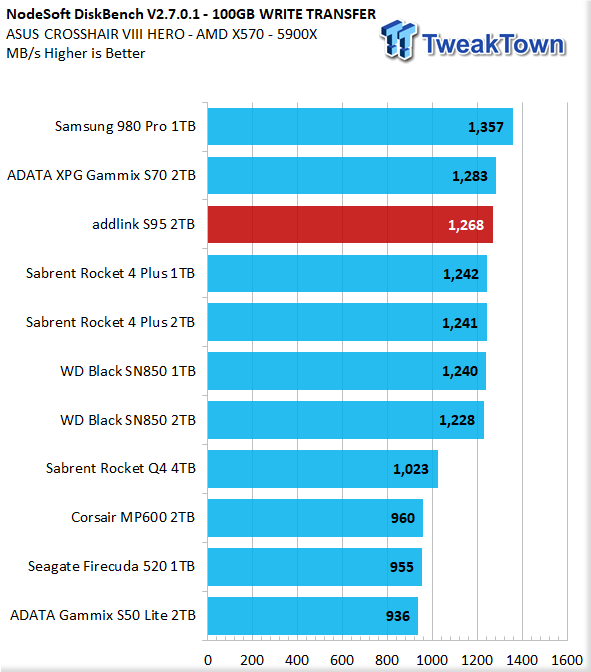
Real-world transfers are something the S95 does very well, as evidenced by its best to date performance for an E18 powered SSD. The S95 easily digests our massive and hard to deal with 100GB transfer folder composed of more than 62K random types of files. Excellent.
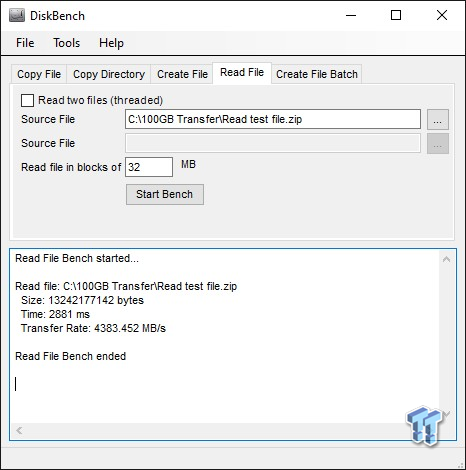
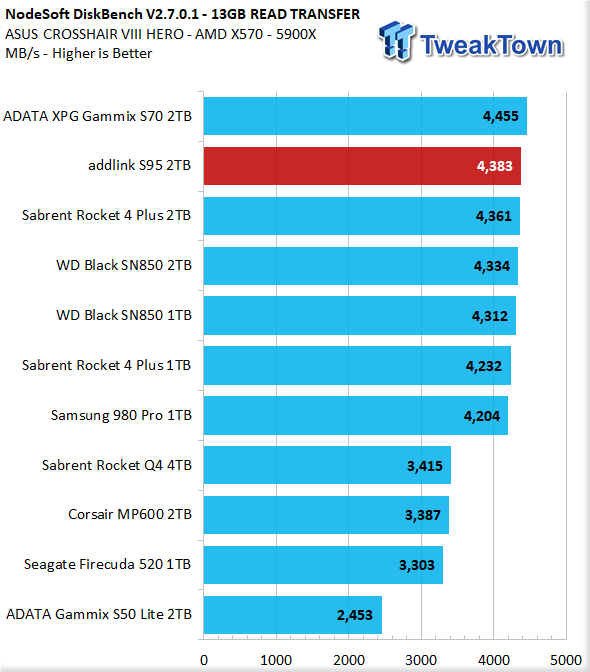
Read transfers are again easily dealt with by addlink's S95 2TB. The drive delivers another beastly performance, again demonstrating its prowess in real-world use case scenarios.
Game Level Loading
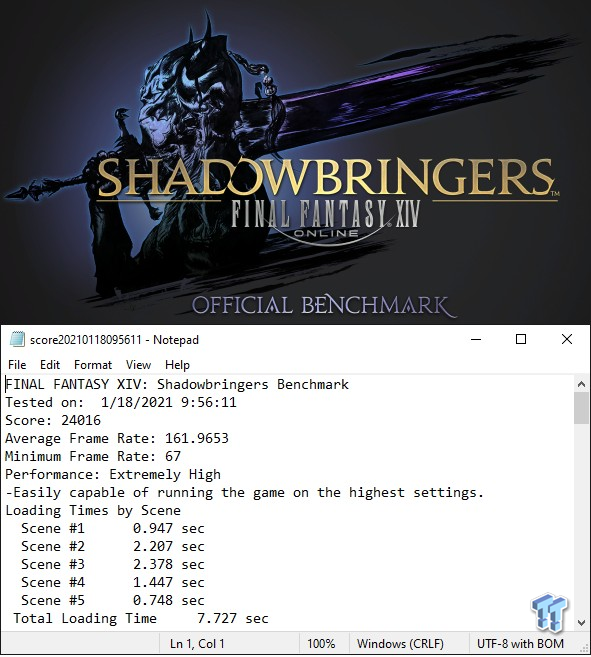
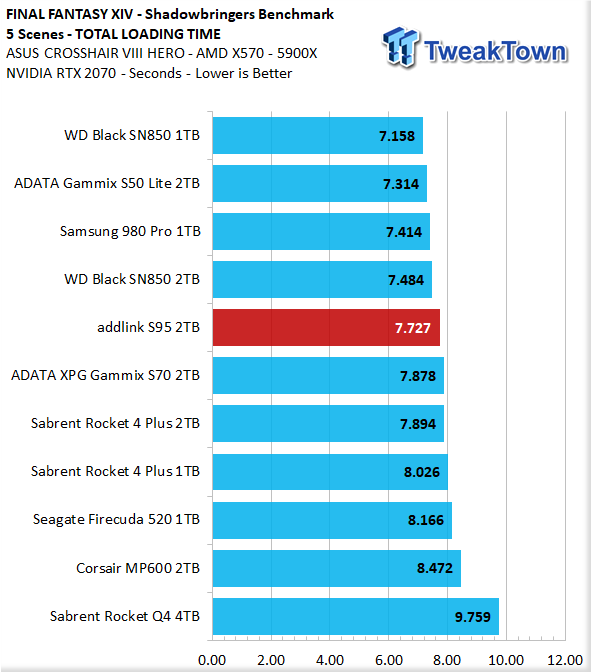
As this test demonstrates, Phison has made great strides in gaming performance with the E18 controller. The S95 2TB delivers the best game-level loading performance we've seen from a Phison powered SSD to date. Nice.
Real-World Testing: PCMark 10 Storage Tests
PCMark 10 Storage Test is the most advanced and most accurate real-world consumer storage test ever made. There are four different tests you can choose from; we run two of them.
The Full System Drive Benchmark and the Quick System Drive Benchmark. The Full System Drive Benchmark writes 204 GB of data over the duration of the test. The Quick System Drive Benchmark writes 23 GB of data over the duration of the test. These tests directly correlate with user experience. Of the two tests, we feel that the Quick System Drive Test most accurately replicates a typical user experience.
PCMark 10 Full System Drive Benchmark
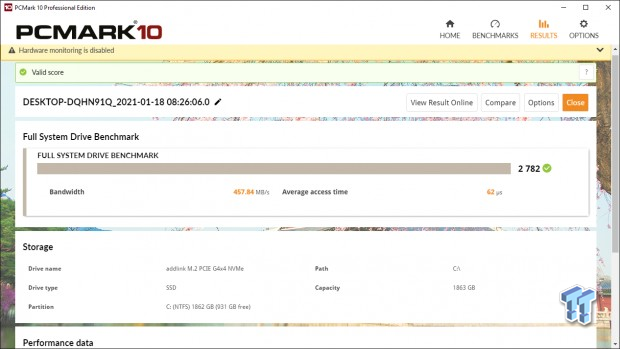
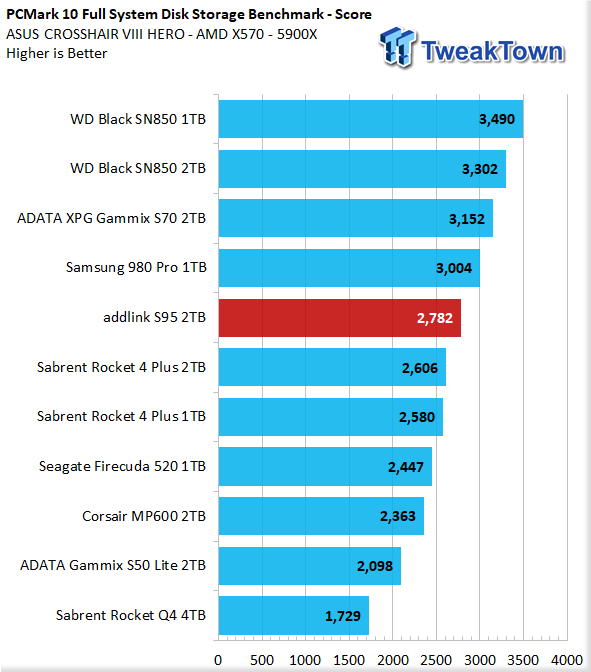
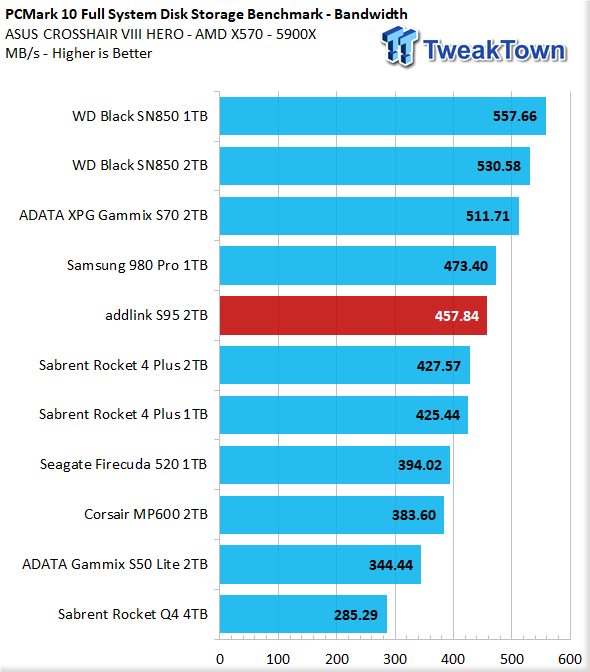
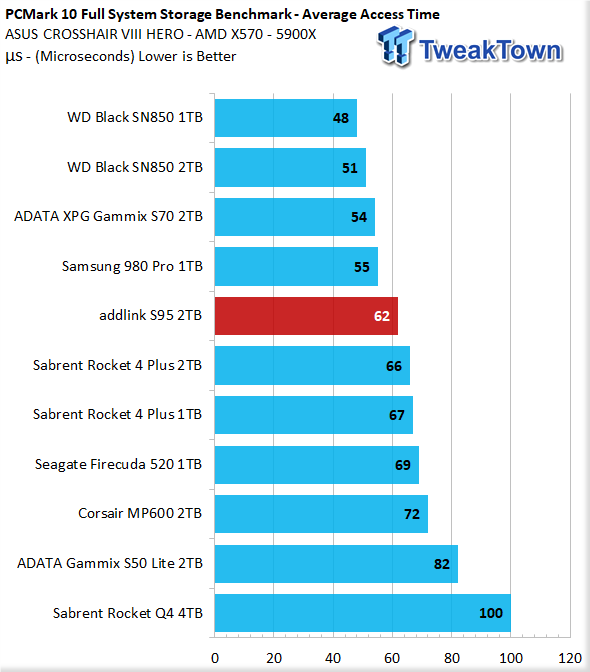
A storage bandwidth of 450 MB/s plus while running the Full System Drive Benchmark is something we've yet to see from a Phison powered SSD, and surprisingly, the S95 gets it done. This indicates that the S95 will deliver heavy workload performance that is among the best available for a consumer SSD. Prosumers take note.
PCMark 10 Quick System Drive Benchmark
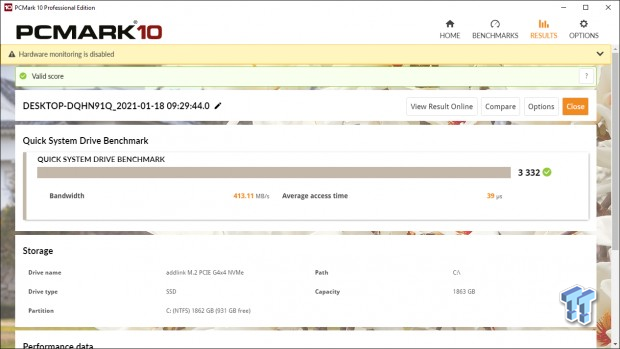
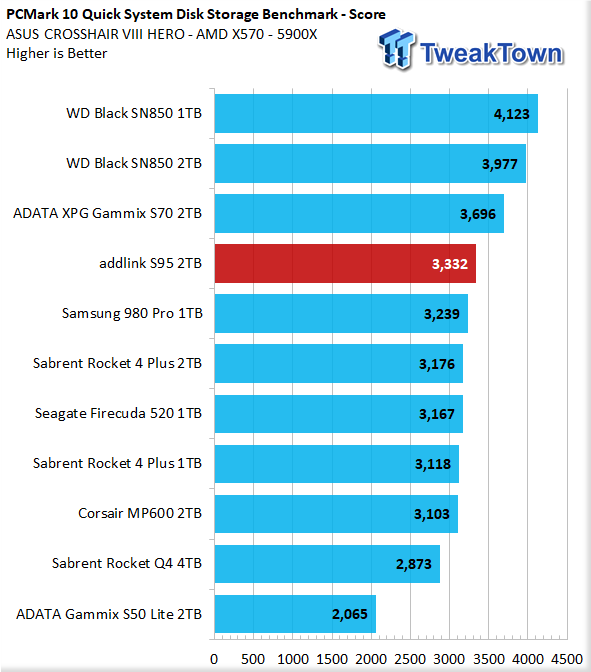
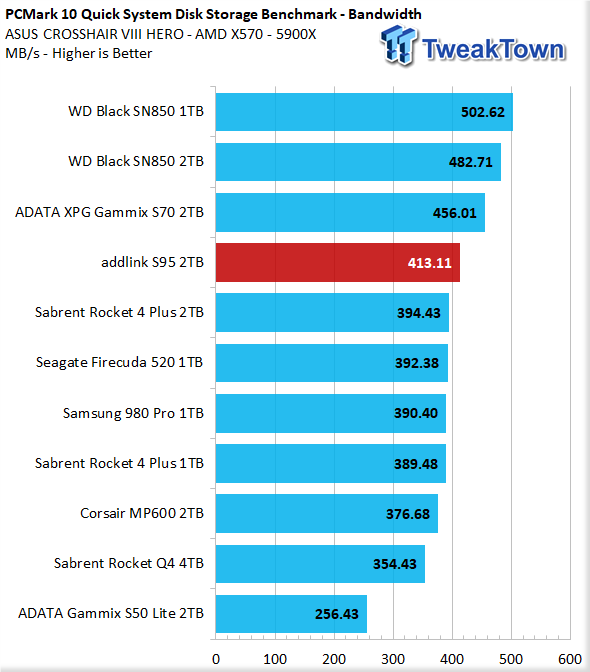
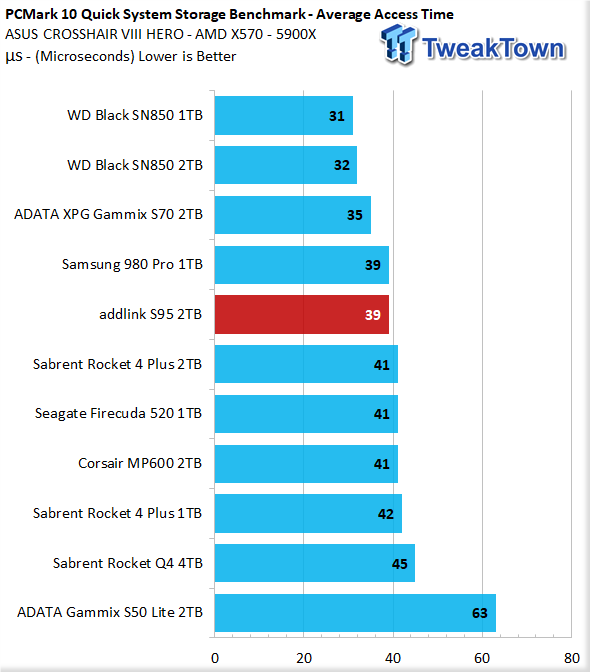
The S95 again demonstrates that it is among the fastest SSDs on the planet when digesting moderate consumer workloads. This is where we want to see performance most of all, and the S95 2TB delivers the goods in a big way. Impressive.
Final Thoughts
addlink's S95 is on point. It delivers the massive throughput that today's enthusiasts crave. It's also capable of 1.2 million random write IOPS, which is best in class. The S95 doesn't come with a heat sink or thermal label, and we are fine with that because most Gen4 enabled motherboards these days have integrated M.2 heat sinks that are very effective. Additionally, E18 SSDs still run relatively cool without any heat sink, and consumers will rarely, if ever, induce throttling with no thermal mitigation.
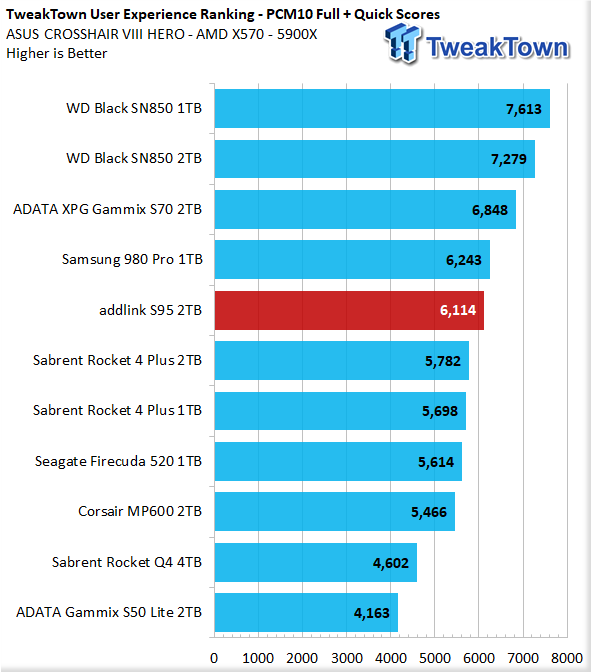
Overall user experience is what matters as we see it, and the S95 delivers some of the best we've seen for any Gen4 consumer SSD. This combined with over 7,000 MB/s throughput should put a smile on any enthusiasts' face.
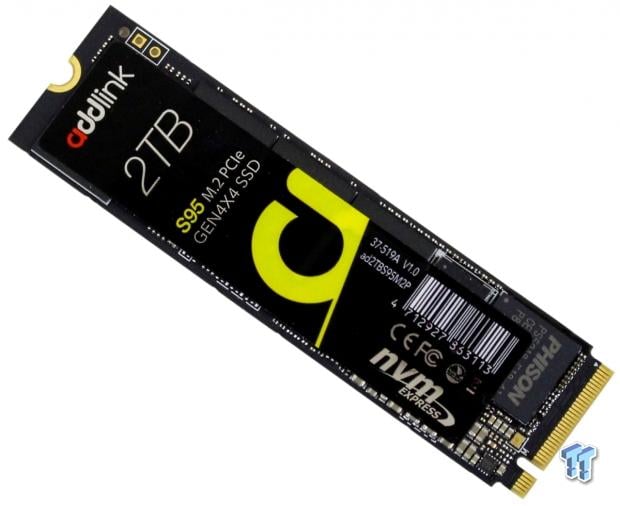
Our testing revealed several highlights worth noting. Beginning with CDM, the S95 delivered over 7GB/s sequential throughput. Following that, the S95 delivered the second-best overall Anvil's score we've seen to date. The S95 then went on to demolish AS SSD by delivering for only the second time in lab history an 11K total score. When tested with ATTO, sequential write speeds saw the S95 2TB deliver a new lab record.
Moving on to real-world testing, the S95 2TB served our data block to the host at the second-best rate we've seen to date. Gaming, while not the best results we've ever seen, saw the A95 2TB delivering the best performance we've seen from any Phison powered SSD. Finally, the S95 showed impressive performance with both heavy and moderate consumer workloads.
addlink's S95 2TB is one of the fastest Gen4 SSDs we've tested to date, and as such, it is well-deserving of TweakTown's highest award.
Pros
- Sequential Performance
- Gaming
- Consumer Workloads
Cons
- Random Read

Performance |
97% |
Quality |
100% |
Features |
90% |
Value |
90% |
Overall |
94% |
If you want the best of the best then addlink's S95 2TB deserves a close look.

What's in Jon's PC?
- CPU: AMD Ryzen 7800X 3D
- MOTHERBOARD: GIGABYTE AORUS Master X670E
- RAM: Kingston Fury Renegade 7200MHz 32GB
- GPU: ZOTAC AMP Extreme GeForce RTX 4090
- SSD: Crucial T700 2TB Gen5
- OS: Windows 11 Pro
- COOLER: Lian Li Galahad 360 AIO
- CASE: Lian Li Lancool III
- KEYBOARD: Corsair K65 RGB Mini
- MOUSE: SteelSeries AEROX 5 Wireless
- MONITOR: ASUS ROG Strix PG27AQN 360Hz 1440p ULMB2
Similar Content
Related Tags

